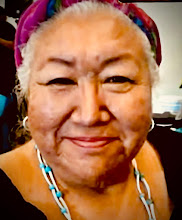- Barman, Jean. "Taming Aboriginal Sexuality: Gender, Power and Race in British Columbia, 1850-1900." BC Studies no. 115/116 (Winter 1997/98); 237-266.
- Welter, Barbara. "the Cult of True Womanhood," American Quarterly 18 (1966): 151-174.
As in this site I can attach video and links: therefore, I am brainstorming as to how to find a different way of discussing what appears to be a taming the sexuality of our young indigenous females by this plastic medicine man.
As I listen to the audio tapes, its like living through a wild west movie in the way our gender was used against us. All ones needs to do is search for names of indigenous women within documents about Indian Residential School, there are none. I'll search to see if I can find something noting any documentation by Indian Agents, legislation, Parliamentary discussion regarding a positive perspective of our gender.
I am hoping to video tape women who are leaders within our community. Their identity maybe secured to hide their identity and their words will be taped in the language they grew up speaking.
I wish to give this topic of a Plastic Medicine Man a historical perspective. Rather than focusing on his negative behavior, I've realized when I first met him that he thrives off both negative and positive discourse around him: therefore, I am taking this away from him. There will be a section that will still updates about his whereabouts as alerts given to me by locate readers and social media sources.
My art practice isn't just being a painter. It's dealing with issues around gender and sexuality.
- similarities between two groups; indigenous peoples of the Americas and Jews, both having experienced genocide and the after effects within our communities that are so similar in how plastic medicine men and rabbis have similar behavior in exploiting our most vulnerable people within our communities.
This trafficking of indigenous girls is historical. This attitude expressed in research documents of young women described as "the savage was so thin and washed out" ... they were able to find happiness...sold to old chief." (Barman)
Reconciliation....
Sexualizing ceremonies involving girls (these events are historical and still continue today without question) My hope is that, you, the reader will start to think about your own attitude towards indigenous females. "the campaign to tame Aboriginal sexuality so profoundly sexualized aboriginal women that they were rarely permitted any other form of identity."(Barman) Taking away from sexualizing indigenous women within the ceremony, I am hoping to bring a discussion on this site. Interviewing various women about their roles within their community, their homes and within themselves.
Reconciliation..
My mind wanders as this topic is so close to me, not just in the fact that I've met this plastic medicine man; however, its also the attitude indigenous men have towards my gender. I realize its historical too and yet there must be something we as indigenous can do to help young indigenous women protect themselves and their children. As reports come back to me about the behavior the women who travel with this plastic medicine man are too vulnerable and are not allowed to interact with others. "The sexualization of Aboriginal women's agency removed any sense of responsibility. Even as his friends were deciding whether to be jealous, "he and his lady had a bad row, and realizing that his little romance was ended he fired her out, and as none of the rest of the old boys were gallant enough to take a chance on her, the lady returned to the bosom of her tribe, and once more there was peace on earth in the little community." (Barman)
I hope this site will evolve into something that makes you think about "what is it about me that caused this?" Too many times a rift occurs between our genders when topics of attitudes towards each other occur. Rightfully so, we bring our own baggage within and relationship even when its just discourse.
I hope you will continue reading. I am researching Indian Residential school and its impact on the female gender and our sexuality. As one of my Facebook friends puts it: (paraphrasing) "Reconciliation for indigenous women is important. Our indigenous men must first come home and reconcile with their moms, sisters, daughters, grandmothers and themselves before any reconciling of any type is to occur. Far to many times, I've been to busy doing other things to look at what other indigenous women are doing and have done and will continue to do until their last breath. Many have worked in Ottawa, they've seen and watched how our men continually do not look after themselves. Whatever has driven them to succeed comes with an emotional price. For too long, the government favors these men. Men who laugh at our elders and laugh at our women. Their rage, hate and lack of empathy towards their own sisters, mothers, aunts and grandmothers gives them shame. The government knows this and using it to the best of their ability against their own people.
This effort to praise our indigenous men who are hired in key positions is historical in records. I sometimes wonder if this is the reason our men turned to alcohol. Are they trying to drown their shame of being indigenous or are they just too detached to care about what's happening to their sisters? I tend to think less; however, I am not like most indigenous women. These indigenous men should be so fortunate others are forgiving souls. I on the other hand know that their trauma needs to heal.


